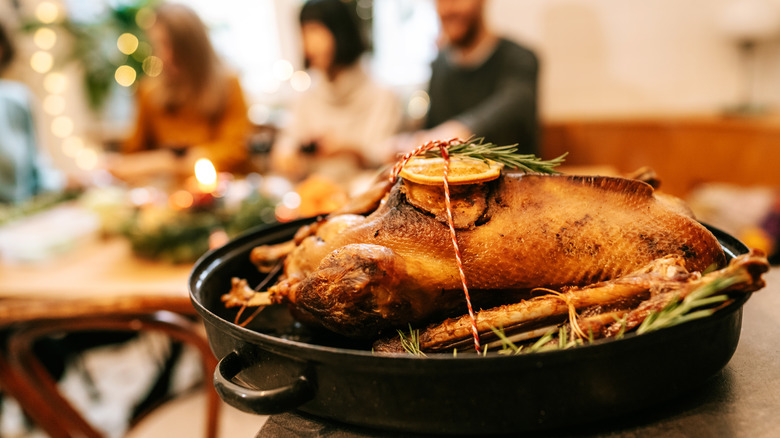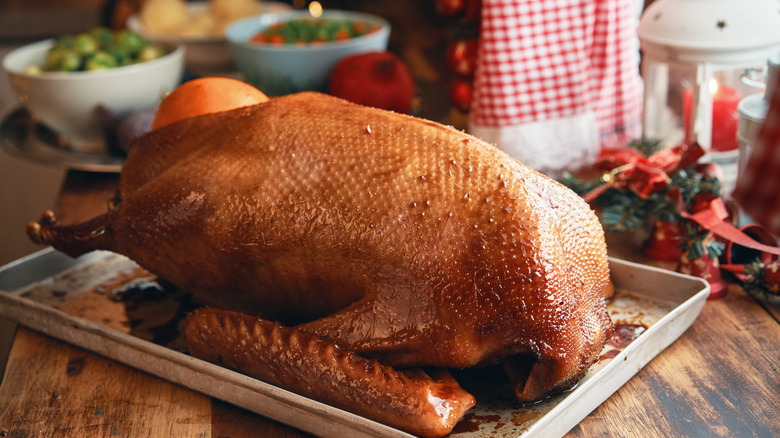The Rise And Fall Of The Classic Christmas Goose
If you were to ask people from around the world what they eat for Christmas dinner, you'd get different answers. But there are more Christmas tradition varieties today than there were in the past. For centuries, the roasted Christmas goose was the most classic, traditional dish on American and European dining tables.
But today, roasted goose doesn't make the list of the top 10 most popular Christmas dishes in America. Per YouGov, turkey is the first meat to appear on the list, followed by prime rib, roast beef, steak, and chicken. While the list also features other non-meat dishes — such as various potato and vegetable dishes — goose ranks at a low-earning 55th spot.
So, what happened to the traditional origins of the Christmas goose? For centuries, people worked hard throughout the year to relish in the flavors of a roasted and fatty goose. But now, the goose has been overshadowed.
The Christmas goose's long history
The history of why goose was a preferred meal offering in centuries past is due to a number of reasons. Before we could just drive ourselves to a grocery store, people had to raise, grow, and cultivate their food. As Birds + Wild explains, geese have a relatively short egg-laying season, making them a better choice for roast meat than chickens, which produce eggs much more frequently.
The tradition of eating roasted goose dates back as far as the late 1500s. It's said that Queen Elizabeth I of England had everyone consume a roasted goose for Christmas because it was what she was doing as she caught the good news of English victory over the Spanish Armada (via Random Times). After that, it stuck throughout England as the staple Christmas dish. A feast of roasted goose was also traditionally served during Michaelmas, the feast of St. Michael, to ring in prosperity for the coming farm year ahead, according to the British Poultry Council.
But because geese are more expensive and difficult to raise, other meats were deemed more acceptable to serve during the holidays as time went on. According to Southern Fried Science, the 1940s focused on breeding turkeys, so there was a surplus — millions, in fact — that were available to eat and roast for Thanksgiving and Christmas. More working-class families were able to afford a big bird. But instead of a goose, it was cheaper (and just as good) to eat a turkey.
Goose is still on the menu
The tradition of eating goose for Christmas is not completely gone, however. You can still cook a Christmas goose for the big dinner, but you'll need to plan ahead because there aren't many commercial goose farms in the U.S.
According to Agweek, a website that covers agricultural news in the upper Midwest, just one farm — Schiltz Farms in Sisseton, South Dakota — produces around 90 percent of all the domestic geese raised for food in this country. If you want to buy a processed goose, you probably won't see them for sale in most regular grocery stores because there just isn't enough demand. You can definitely order one online or through a reputable local butcher, but chances are it'll come from the Schiltz farm. If you're in the mood for goose this holiday season, try looking around at meat departments that stock diverse products and local farmer's markets to find farmers who raise geese. You can also talk to the butcher counter at your local grocery store, especially the butchers at community co-ops, who tend to source their meats from local farmers.
Goose is expensive
If you're getting your palate primed for a big goose dinner this holiday season, you might want to check your bank account first. Because geese are not nearly as popular as turkeys or other commercially raised game birds, they command a much higher price as a specialty product. The Schiltz website lists them for sale at $181 each, a price that perhaps only royalty can pay. You might have better luck finding less expensive birds from a local producer, but you will probably have to order them in the spring or summer to be ready for butchering in the late fall and early winter. It stands to reason that the high price and limited availability contribute to the unpopularity of goose dinners at American holiday tables. With that said, the Schiltz website says that all of their 2023 birds are sold out, so if you want to celebrate the holiday like Queen Elizabeth I, you'll either have to find a local producer or wait until 2024 to order a fattened goose for Christmas.



